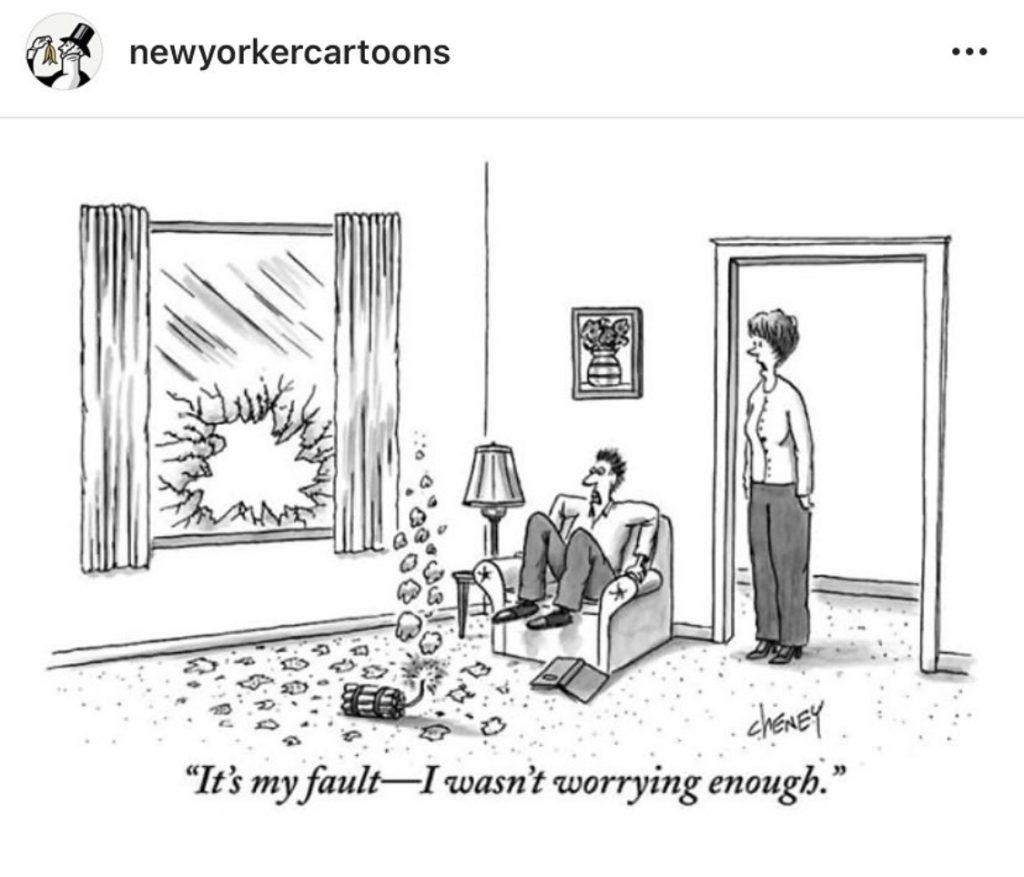
Well, hello there! I want to thank you for your patience before reading this post. I have been doing my best to keep my Instagram and Facebook pages up with videos and content! Those are a faster way for me to get information to you, but that does not mean I have given up on writing! So, let’s get back to it!
I have talked a lot about focusing on what you have control over and taking action. The same rings true when we think about worry.
So what exactly is worrying?
First, I clarified on my social media pages that worry is a thinking problem, not a feeling. This is a very common misconception and can be confusing when we think about how to deal with it.
Worry is thinking about the future, usually involving thoughts about things that might go wrong and whether we will be able to handle this. It is possible to worry about events of the past, but this worry is typically about how this past event can impact our future.
Is worrying “normal”? When is worrying a problem?
Everyone worries about something at some point in their lives. As an anxiety professional, we look at the frequency of worry and how much it interferes with daily functioning.
Side note: I personally do not like the word normal. I believe everyone has their own normal, and I do not want anyone to feel bad because what they are experiencing is not “normal.” I do believe the word normal can be helpful when it helps us recognize that we are experiencing can potentially be better. That we do not have to live a life where worry is taking over. I like the word regular better. Feel free to let me know your thoughts on this.
Anyway, it is possible that people have regular worry when facing something new or having a problem. This regular worry usually does not interfere much with day-to-day functioning because the person feels in control of their worry. Worry can become more of a problem when it occurs frequently and intensely, feels uncontrollable, and gets in the way of your functioning (i.e., sleep, focusing on tasks). You get what I mean.
Productive worry vs toxic worry
So, in the psychology field, you will often hear about productive vs nonproductive worry (aka toxic worry). I, personally, like to lump worry into one category. For me, I think it is helpful to start by thinking about worry as one thing. From there, we can look at the worries you have control over, which is what others would call “productive worry,” and the ones you do not have control over, which is what others would call “nonproductive” or “toxic” worry. You can use whatever works best for you.
I do not want anyone to confuse worrying as being productive in any way, which is why I do not like the term. It is what you do with that worry that can be productive! As I have said before, we do not control what our brain comes up with, but we do control how we respond to it!
Taking action!
I talked in my last blog post on taking action when I was worried about my children’s exposure to COVID-19 at school. I want to be clear that the goal is to not always think that you must control everything possible to get the results you want. Some people will look for that, realize they can’t control everything, and then give up on taking action. The goal is to focus on the things that you do have control over, and then take action on those things.
Does this make sense? There are times where we have to recognize that we only have control over so much, and the rest is out of our hands. The main point: We did everything we could with what we had! How can we possibly expect more than that?? It is impossible!
Myths about worry
There are so many myths about worrying out there! These myths are, interestingly, the things that make worriers not like not worrying! Doesn’t that sound backwards? Think about it. If someone comes to treatment, they usually want to stop worrying and they do not know how to. At the same time, I often find that they do not like not worrying because of false beliefs they have about worrying. For example, if you believe worrying shows that you care, I am going to guess your anxiety monster is telling you that you no longer worrying excessively about your child must mean that you do not care about them as much.
Lies, Lies, Lies.
Other common myths include worry helps me prepare for the worst, worry prevents bad things from happening, worry protects me from feeling bad later or being disappointed, worry defines me as a person, and worry motivates me.
The reality is that none of these are true. Worry only drains your energy. You deserve so much better than this.
More to come on this! Feel free to comment with any questions you have related to this topic!
Xoxo,
Andrea